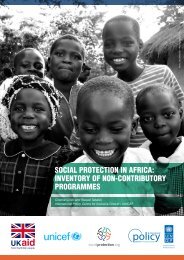https://goo.gl/sZ7V7x
293g79C
293g79C
You also want an ePaper? Increase the reach of your titles
YUMPU automatically turns print PDFs into web optimized ePapers that Google loves.
Labour-Intensive Public Works Programme<br />
Programme<br />
Country<br />
Geographic area<br />
Labour-Intensive Public Works Programme<br />
Guinea<br />
Sub-Saharan Africa<br />
Previous programme name (if any)<br />
Start date 2013 1<br />
Programme objectives To provide income support to vulnerable groups. 2<br />
Programme type<br />
Cash for work; training<br />
Programme components<br />
Conditionalities (if any)<br />
Targeting methods<br />
Geographical targeting<br />
The beneficiary targeting process combines a self-selection approach<br />
and community-based selection. A targeting committee has been created<br />
in each community to select beneficiaries among all those who would<br />
have registered after the sensitisation campaign.<br />
Target areas<br />
Urban and peri-urban areas.<br />
Target groups<br />
Underemployed and unemployed people.<br />
Eligibility criteria<br />
Beneficiaries are underemployed and unemployed youth<br />
(over 18 years old) who are able to work. 2<br />
Eligibility reassessment (if any)<br />
Type of benefits<br />
Cash<br />
Amount of benefits<br />
GNF35,000 per day; the amount depends on the specific<br />
areas of intervention and their current market rates. 2,3<br />
Payment/delivery frequency<br />
Weekly<br />
Benefit delivery mechanism<br />
Benefit recipient<br />
At least 40 per cent of beneficiaries should be women.<br />
Minimum and maximum<br />
30 days of work per beneficiary<br />
duration of benefits (if any)<br />
Coverage 24,000 beneficiaries 2<br />
Programme expenditure USD16.5 million (2012) 2<br />
Institutions and agencies involved Government of Guinea; World Bank<br />
Monitoring and evaluation<br />
mechanisms and frequency<br />
See the references on page 171: Labour-Intensive Public Works Programme<br />
The Safety Net Unit—Cellule Filets Sociaux (CFS)—and its monitoring<br />
and evaluation specialist are responsible for coordinating the<br />
monitoring and evaluation activities and impact evaluation. 2<br />
Social Protection in Africa: inventory of non-contributory programmes | 55



